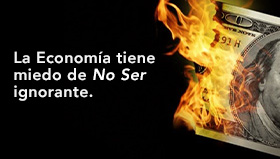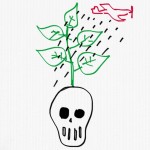José Ingenieros (April 24, 1877 – October 31, 1925) was an Argentine psychiatrist, pharmaceutic, doctor, criminologist, sociologist, positivist philosopher and essayist. He was born Giuseppe Ingegneri in Palermo (Italy), and graduated from the University of Buenos Aires School of Medicine in 1900. He wrote a very important philosophical and social thought, “El hombre mediocre” (The Mediocre Man), in 1913. (the underline is mine)
The mediocre man is incapable of using his imagination to conceive ideas which propose a future worth fighting for. Hence turning submissive to every routine, to the prejudices, to the domesticities, and becoming part of a herd or community, whose actions or motives are not questioned, but followed blinded. The mediocre man is docile, malleable, ignorant, a vegetative being, who lacks personality, contrary to perfection, supportive and accomplice to created interests that make him a lamb of the social herd. He lives according to conveniences and does not learn to love. In his easygoing life, he turns vile and skeptic, coward.
The mediocre man does not accept ideas different from those received by tradition, not realizing that beliefs are relative to who believes them, allowing people with contrary beliefs to coexist at the same time. Moreover, the mediocre man engages battle against idealism by mere envy, tries desperately to darken any noble action, because he knows that his existence depends on the idealist never being (socially) recognized nor placed above him.
Although mediocre can strike you as offensive, in this context it is used as synonym for the non-usage of the human potential. Think about it… let us try to extrapolate it to a simple and daily example: holidays and the culture of work. Nowadays, in our country holidays are added every now and then. If a national holiday falls on Thursday, then make it Thursday AND Friday!, why not? It is in order to “reactivate the economy and to make the country prosper”, though consumption is fomented in a subtle manner, to go out shopping, to keep going inside the cycle the system proposes (imposes). And the consequences are many, in the long term. Of course, the cultural numbness implies consumption, but environmental degradation as well. The mediocre man is a shadow projected by society, said Ingenieros. Hence, the ego comes back again as the engine that drives that projection.
While many in the big city plan a new get away for the long weekend, the subtle begins to manifest: corporate interests threat the green public spaces in Buenos Aires, the Ecologic Reserve in Costanera Sur is receding. Plans are being made to build more than 700.000 square meters of departments and stores. In ecoportal.net’s article, where this issue is touched, the fact that the construction of an excluding neighborhood is privileged, and that the public patrimony is now in a second plane is seen as a negative aspect. The Ecologic Reserve now suffers the consequences of a political management that does not attend the public spaces by not financing them.
Hence, I feel we cannot be alien to these things. An d I believe that only by bringing the attention of everybody, only bringing awareness and educating you can make a change. José Ingenieros speaks of the idealist man as well, which comes to be the type of person we have to aim to be. Let utopia enter our lives again.
The idealist man is capable of using his imagination to conceive legitimized ideals only by experience and he tends to follow pipe dreams, ideals of perfection way up high, in which his faith is deposited, to change the past in the name of what will come; that is why he is in a constant process of transformation, which is adjusted to the variations of reality. The idealist contributes to social evolution with his ideals, by being original and unique; he is an individualist being who does not submit to moral nor social dogmas; consequently, the mediocre are against him. The idealist is a dreamer, an enthusiast, cultured, with a different personality, generous, undisciplined against the dogmatic. As a being who prefers quality, he can distinguish among the good and the bad; and not among the more or the less as the mediocre man would do.
Amazing this José Ingenieros… Honestly, I did not know him, but I wanted to know who he was as I live on a Street that carries his name. Another couple of interesting books he wrote are “The Moral Forces” and “A treaty for love”
“Our life is not worthy to be lived if not nobbled by some ideal”
“In any time and place, he who expresses his truth in a loud voice, as he believes it, in a loyal manner, causes unease among those who live in the shadow of created interests”
“Routine is the habit of quitting thinking”
– José Ingenieros.
Cheers!,
Brian Longstaff.-



















Seba Roldán Dec 12 , 2011 at 10:18 AM /
Buenisimo Brian!!!!! me viene bien esta lectura para arrancar la mañana!!!!
Brian Longstaff Dec 12 , 2011 at 12:23 PM /
Gracias Seba, son los 5 minutos de lectura semanales!! – al apoyo es invaluable! Cheers!